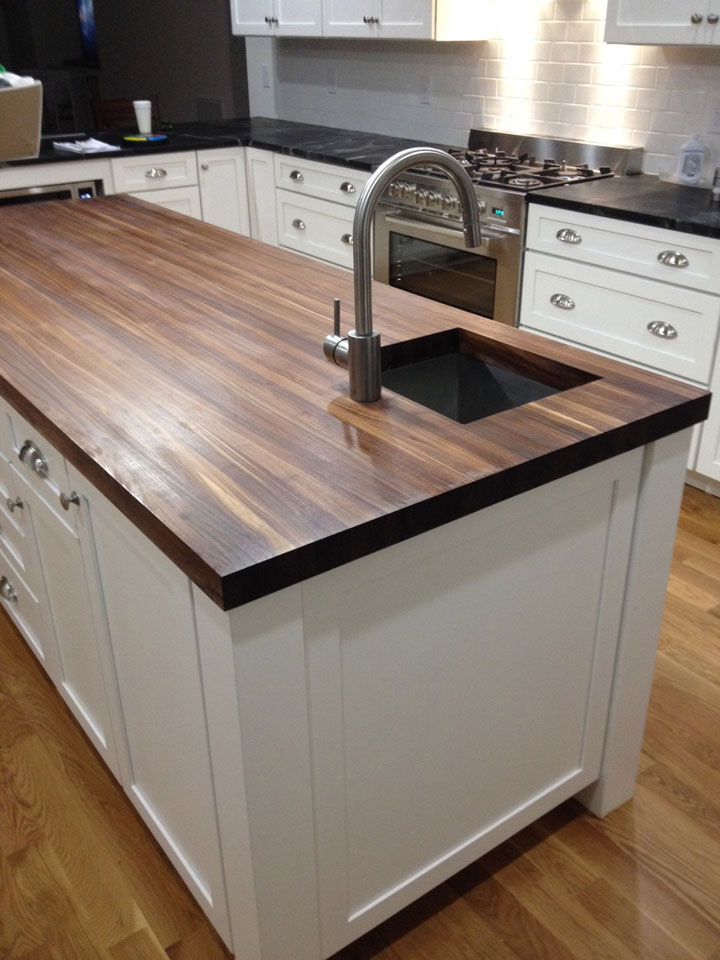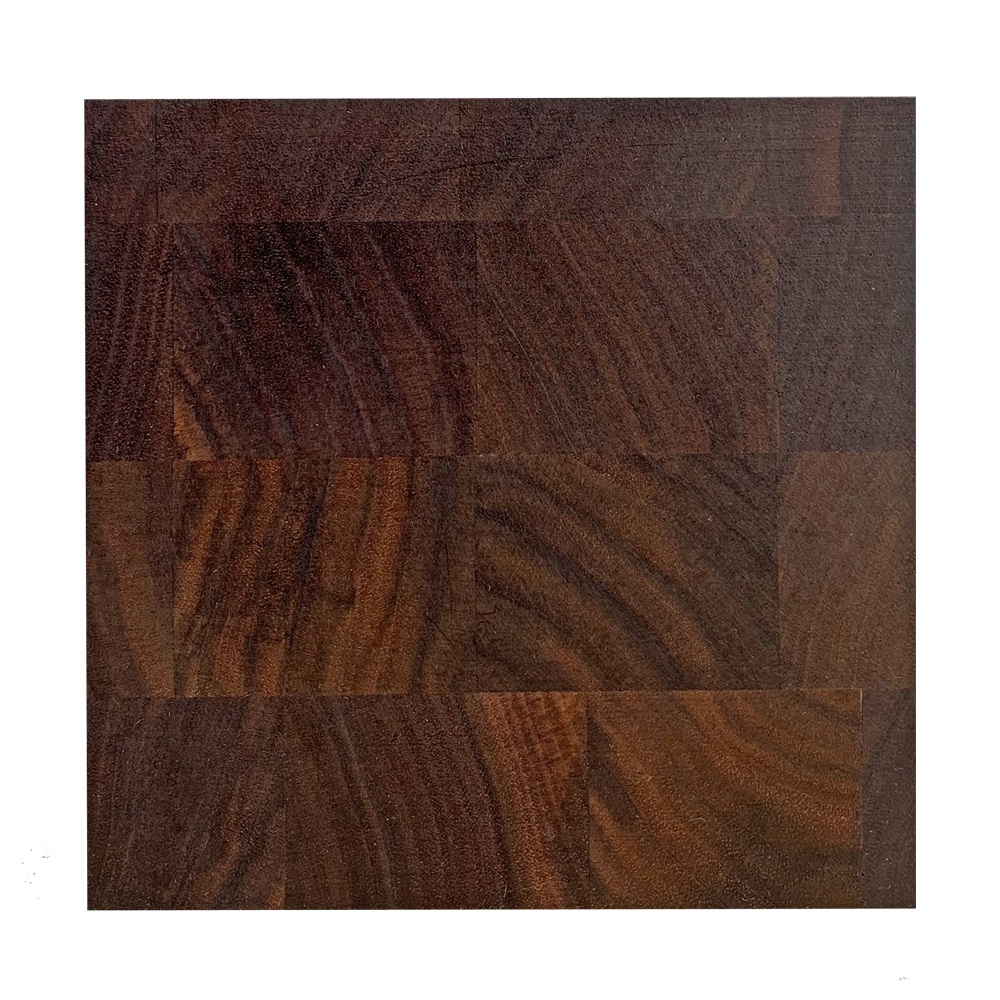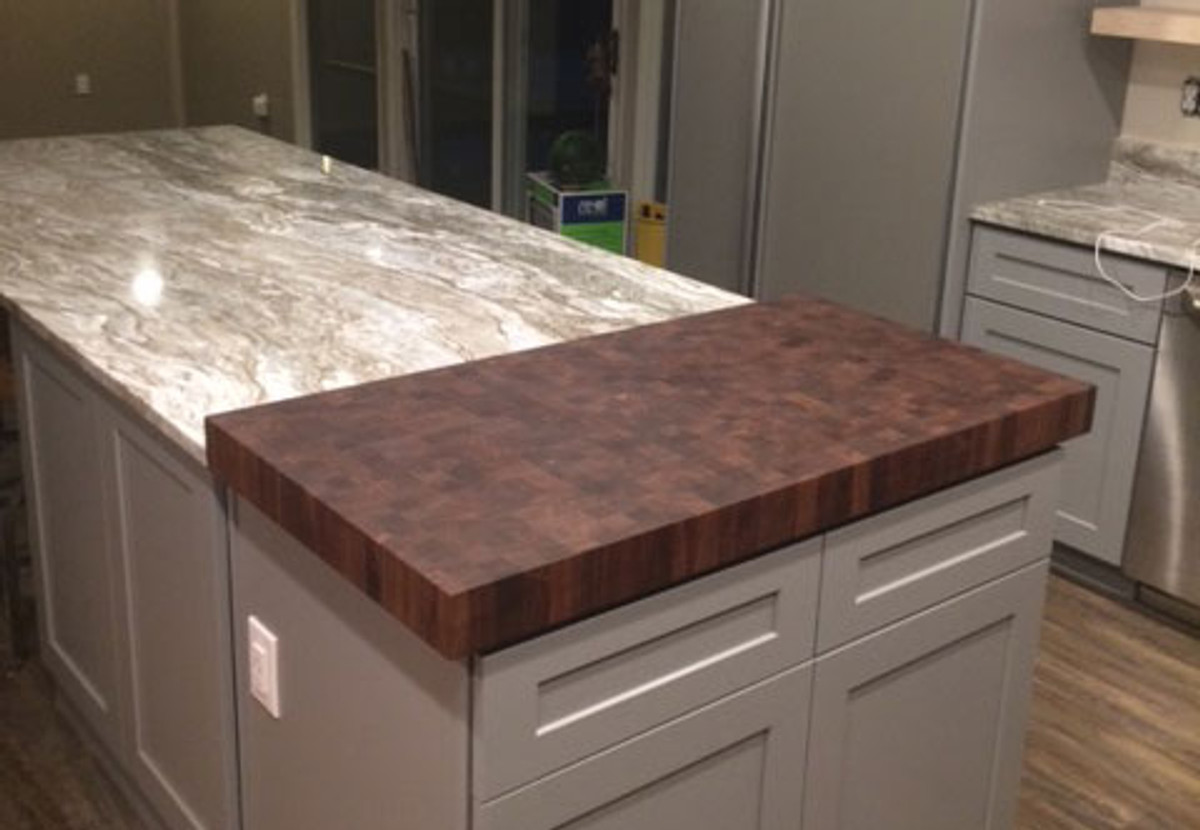Walnut end grain butcher block countertops are a luxurious and functional addition to any kitchen. These countertops are crafted from walnut wood, with the end grain facing up to create a durable and visually striking surface. Here’s a comprehensive guide to walnut end grain butcher block countertops, including their characteristics, benefits, maintenance, and cost:
Durability: Walnut is a hardwood known for its strength and durability, making it an excellent choice for butcher block countertops. End grain construction further enhances durability by minimizing wear and tear, as the wood fibers are oriented vertically, allowing them to absorb impact and resist knife marks.
Visual Appeal: Walnut wood boasts a rich, deep color with distinctive grain patterns that add warmth and character to any kitchen. End grain construction creates a unique checkerboard pattern that enhances the countertop’s visual appeal, making it a focal point of the kitchen.
Functionality: Walnut end grain butcher block countertops are highly functional and versatile. They provide a sturdy and resilient surface for food preparation, chopping, and cutting, while also serving as a stylish and durable countertop for daily use.
Natural Antibacterial Properties: Wood, including walnut, has natural antibacterial properties that make it an ideal material for butcher block countertops. Research has shown that certain types of wood possess inherent antimicrobial properties that can help inhibit the growth of bacteria on the surface.

Maintenance: Proper maintenance is key to preserving the beauty and integrity of walnut end grain butcher block countertops. Regular cleaning with mild soap and water, along with periodic oiling with food-grade mineral oil or butcher block conditioner, helps nourish the wood, prevents drying and cracking, and maintains a lustrous finish.
Resilience to Knife Marks: The end grain orientation of walnut butcher block countertops makes them highly resistant to knife marks and scratches. The wood fibers absorb the impact of cutting, which helps preserve the surface of the countertop and maintain its smoothness over time.
Heat Resistance: Walnut wood is naturally heat-resistant, making it suitable for use in the kitchen where hot pots, pans, and dishes are commonly placed. However, it’s still advisable to use trivets or hot pads to protect the surface from excessive heat exposure and potential damage.

Customization: Walnut end grain butcher block countertops can be customized to fit specific kitchen dimensions and design preferences. They can be fabricated in various thicknesses, edge profiles, and sizes to accommodate different kitchen layouts and styles.
Sealing: While walnut is naturally resistant to moisture, it’s important to properly seal end grain butcher block countertops to protect them from water damage and stains. Applying a food-grade sealer or finish helps create a protective barrier that repels moisture and prolongs the life of the countertop.
Cost: Walnut end grain butcher block countertops are considered a premium option and typically come with a higher price tag compared to other materials. The cost varies depending on factors such as the size of the countertop, thickness, customization, and supplier or fabricator.
Longevity: With proper care and maintenance, walnut end grain butcher block countertops can last for decades, making them a durable and long-lasting investment for your kitchen. Regular cleaning, oiling, and sealing help prolong the life of the countertop and ensure its continued beauty and functionality.
Environmental Sustainability: Walnut is a sustainable and renewable resource, making it an environmentally friendly choice for butcher block countertops. Responsible forestry practices ensure that walnut wood is harvested sustainably, minimizing environmental impact.

Installation: Installing walnut end grain butcher block countertops requires professional expertise to ensure proper fitting, sealing, and support. Professional installation helps prevent issues such as warping, cracking, or unevenness and ensures a seamless and durable countertop surface.
Aesthetic Versatility: Walnut end grain butcher block countertops complement a wide range of kitchen styles, from traditional to contemporary. The rich color and natural beauty of walnut wood add warmth and elegance to any kitchen design, making it a versatile and timeless choice.
Value: While walnut-end grain butcher block countertops may come with a higher upfront cost, they add value to your home and enhance the overall aesthetic appeal of your kitchen. Their durability, functionality, and timeless beauty make them a worthwhile investment that can increase the resale value of your property.

Are walnut end grain butcher block countertops prone to scratching?
Walnut end grain butcher block countertops are highly resistant to scratches and knife marks due to the orientation of the wood fibers. The end grain construction minimizes wear and tear, making the surface resilient and durable even with regular use.
How often should I oil my walnut end grain butcher block countertops?
It’s recommended to oil walnut end grain butcher block countertops every 4 to 6 weeks or as needed to maintain their appearance and protect the wood from drying out. Food-grade mineral oil or butcher block conditioner can be applied using a soft cloth or brush, following the manufacturer’s instructions.
Can I use walnut end grain butcher block countertops as a cutting surface?
Yes, walnut end grain butcher block countertops are designed to withstand cutting, chopping, and food preparation. The end grain construction absorbs impact and helps protect the surface from knife marks and scratches, making it an ideal material for a cutting surface in the kitchen.
How do I clean walnut end grain butcher block countertops?
To clean walnut end grain butcher block countertops, simply wipe them down with a damp cloth or sponge and mild dish soap. Avoid using harsh chemicals or abrasive cleaners, as they can damage the wood. Dry the countertops thoroughly after cleaning to prevent moisture absorption.
Are walnut end grain butcher block countertops suitable for use in bathrooms?
While walnut end grain butcher block countertops are primarily designed for use in kitchens, they can also be used in bathrooms with proper care and maintenance. However, it’s important to protect the countertops from excessive moisture and humidity, as prolonged exposure can damage the wood.

End Grain Wood Countertops

Walnut End Grain Butcher Block Countertop Sample

End Grain Walnut Butcher Block Countertop – Customize Online

Durable end-grain walnut butcher block by John Boos echoes new oak

Walnut End-Grain Butcher Block Counter u0026 Island Tops

Related articles:
- Butcher Block Countertop For Kitchen Island
- Can You Paint Butcher Block Countertops
- Butcher Block Countertops With White Cabinets
- Pine Butcher Block Countertops
- Butcher Block Countertops Walnut
- Maple Butcher Block Countertops
- Care Of Butcher Block Countertop
- Butcher Block Countertops Maintenance
- Antique Butcher Block Countertops
- Butcher Block Countertop Sealing